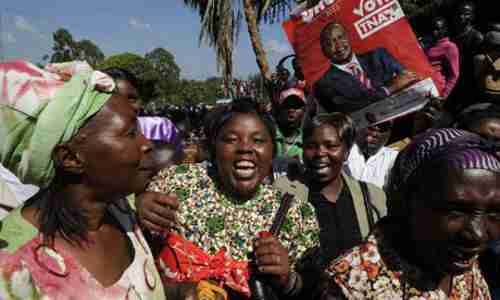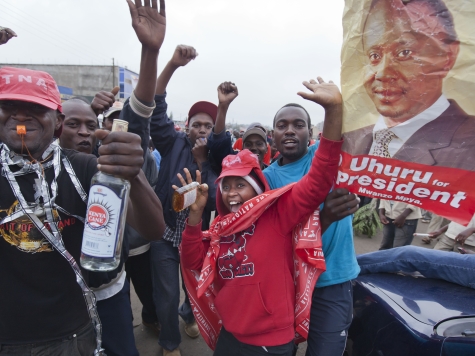
This morning’s key headlines from GenerationalDynamics.com
- Kenyatta is declared Kenya’s controversial presidential election winner
- Kenyatta’s criminal charges provide dilemma for Obama administration
- Violence continues in Egypt’s canal city, Port Said
- Egypt’s army on high alert in Sinai
- Report: Hizbullah has chemical weapons
Kenyatta is declared Kenya’s controversial presidential election winner

Kenyatta supporters celebrate victory on Saturday (AFP)
Kenya’s election commission on Saturday announced that last week thedeeply ethnically divided nation had elected Uhuru Kenyatta to be thenew president by a narrow margin. Everyone’s mind is focus on thefear of new violence similar to what happened after the December 27,2007, elections, when inter-ethnic killings, rapes and amputationstriggered by dissatisfaction with election results killed thousands ofpeople. In his acceptance speech, Kenyatta said,
“I would especially like to acknowledge the Kenyanswho lost their lives on the eve of the elections. They made theultimate sacrifice, laying down their lives, in the name ofdemocracy.
To the families of those who lost their loved ones- I offer mysincere condolences and I assure you that I, and the people ofKenya are standing with you in prayer.
The incidents that took the lives of our officers are a reminderthat security remains one of the biggest challenges to ournation. It is unacceptable to see the lives of Kenyans lost sosenselessly.
As we move forward, I pledge to keep the issue of nationalsecurity high on our agenda.”
However, Raila Odinga, the candidate who lost the election, isnot very happy with the results. In his speech, he listeddollars had been spent on new technology — electronic voter identificationkits and electronic voter tallying systems — that all failed completely,forcing a count of the paper ballots, according to Odinga:
“Two days after the vote, the electronic tallyingprocess was discarded and counting began afresh, manually. Thattoo turned out to be flawed exercise in which, among other things,there was massive tampering with the IEBC voterregister. …
Democracy is on trial in Kenya. It is clear that the process ofelecting a new set of leaders has been thwarted by another taintedelection.””
Odinga’s supporters believe that these failures were intentionalsabotage to give his opponent a victory. However, Odinga askedhis supporters to remain peaceful:
“Any violence now could destroy this nation. …
Let the Supreme Court determine whether the result announced bythe Independent Electoral and Boundaries Commission [IEBC] islawful. We are confident the court will restore the faith ofKenyans in the democratic rule if law.”
The Supreme Court will then have 14 days to hear the dispute and makea ruling whether to call for a new election. Odinga has made it clearthat he expects to win a victory in court. Whichever way the courtdecision goes, it’s going to make a lot of people very angry.Standard Media (Nairobi) and All Africa
Kenyatta’s criminal charges provide dilemma for Obama administration
The fact that Kenya is Barack Obama’s ancestral homeland onlycomplicates the diplomatic dilemma over the fact that winningcandidate Uhuru Kenyatta is under indictment by the InternationalCriminal Court (ICC) for crimes against humanity, stemming from hisalleged involvement in the bloodbath that occurred after the December2007 elections. He’s accused of organizing and funding the deathsquads that killed more than 1200 people, and caused many atrocities.Kenyatta’s trial is scheduled to begin this summer, and many peopleinside and outside of Kenya are wondering how he’s going to be able togovern the nation while he’s standing trial in the Hague.
Western nations, including the United States, are going to bereluctant to have ordinary diplomatic relations with a man whoallegedly committed such these atrocities. In fact, prior to theelection, the U.S. State Department’s top diplomat for Africa, JohnnieCarson, issued a thinly veiled warning to Kenyans that “choices haveconsequences.”
This remark caused a huge outcry in Kenya, where the U.S. was accusedof trying to interfere in Kenya’s election process.As it turned out, Carson’s remark proved to be a big benefit toKenyatta. He portrayed himself as a victim of both the ICCand the United States, and was able to rally his supporters withthose charges. In many ways, the election turned into areferendum on the ICC itself.
Kenya is extremely important to US interests, according to the Councilon Foreign Relations:
“The fact that the U.S. Embassy in Nairobi is thelargest in all of sub-Saharan Africa reflects the country’scentrality to a number of U.S. priorities. Kenya is a significantcounterterrorism partner and an important point of military andhumanitarian access in the region. Kenya has been a vitaldiplomatic partner in efforts to bring stability to Sudan andSomalia. The country is also a regional hub for U.S.,international, and nongovernmental programs as well as thelinchpin for private sector activity in East Africa. Trouble inKenya can quickly infect neighboring countries, as the economicspillover effects of the current crisis have already madeplain.”
From the point of view of generational theory, Kenya’s lastgenerational crisis war was the Mau-Mau rebellion that climaxed in1956, and so a new round of violence has a moderate probability ofspiraling into a full-scale ethnic war. Toronto Star and Council on Foreign Relations (2008)
Violence continues in Egypt’s canal city, Port Said
An Egyptian court on Saturday reaffirmed most of the death sentencesfor 21 Port Said soccer fans, triggering off new rounds of violence inPort Said and in Cairo.
Egypt’s president Mohamed Morsi declared a state of emergency in PortSaid in January after days of violent anti-police riots followed thesentencing by an Egyptian court of 21 people to death forparticipating in a riot in Port Said on February 2 of last year, where74 young people were killed, and over 1,000 injured at a football(soccer) match. ( “27-Jan-13 World View — Egypt in crisis after two days of violent clashes”) Port Said residents claimed that the police hadsided with the supporters of the visiting Cairo team, and were furiousthat the court had let the police go free. In this new ruling,two senior police commanders were giving prison sentences.
On Saturday, angry crows targeted police offices and a police officersclub in both Port Said and Cairo. Evidence presented at the trialshowed that the police had locked the gates, allegedly to allow theCairo supporters to kill as many Port Said supporters as possible.
Violence and instability have been increasing in Egypt since theelection of Muslim Brotherhood president Mohamed Morsi. There areincreasing fault lines between the government and the army, betweenthe police and the army, between the Islamists and secularists, andbetween the Muslim Brotherhood party and the Salafist al-Nour party.McClatchy
Egypt’s army on high alert in Sinai
Egypt’s military commands have ordered troops to be on “high alert,”after receiving information about plots for terrorist attacks inSinai. Violence in the Sinai has increased substantially in the twoyears since the Egyptian Revolution began, and Hosni Mubarak wasdeposed. Islamist militants have been stepping up attacks on Egyptiansecurities forces near the Gaza and Israeli borders. Egypt Independent
Report: Hizbullah has chemical weapons
According to Israeli intelligence researchers, Hizbullah is alreadyin possession of chemical weapons from Syria. However, Syriais afraid to use them against Israel because it fears the backlash.The greater fear is that they’ll fall into the hands of al-Qaeda linkedterror groups, who have no particular fear of a backlash.
With instability growing throughout the Mideast, there’s a fearthat a Mideast war is just around the corner, and that Syria’schemical weapons play a substantial role.
According to Debka, which sometimes gets things wrong, is quoting itsmilitary intelligence sources as saying that al-Qaeda linked Syrianrebel militants have laid hands on sufficient chemical bombs, shellsand warheads – together with missiles and other launching systems – toconduct strikes against seven targets: Assad government centers,Turkey, Israel, Lebanon, Iraq and Lebanon.
According Debka’s report, U.S. officials say the following:
- Al Qaeda’s affiliates may also be setting their sights on US strategic and military targets in the region.
- They have transferred chemical weapons from Syria to armed Al Qaeda bands lurking just 40 kilometers from the Iraqi capital of Baghdad.
- Al Qaeda is funneling poison chemicals to its armed groups on Iraq’s borders with Saudi Arabia and Kuwait for strikes against those countries.
- The trail of chemical weapons from Syria through Turkey has been picked up in Jordan, where they have reached Islamist groups fighting the monarchy. Some bands have infiltrated Amman, the capital, and await orders to go on the offensive; others have fanned out across northern Jordan and are poised to hit the US, British, French, Czech and Polish special forces deployed there.
Whether or not Debka is right about the fact that Syria’s chemicalweapons have already been dispersed to al-Qaeda linked terroristgroups, there’s little doubt that the Mideast is becoming more andmore unstable by the day, and al-linked terrorist groups believe thatthe way to turn the Mideast in a region of strict adherence to themost radical form of the Sunni Muslim faith is to trigger an all-outwar in the region, leaving them behind to pick up the pieces and forgea new Sunni Islamic revolutionary nation. Israel National News and Debka and Debka
Permanent web link to this article
Receive daily World View columns by e-mail

COMMENTS
Please let us know if you're having issues with commenting.